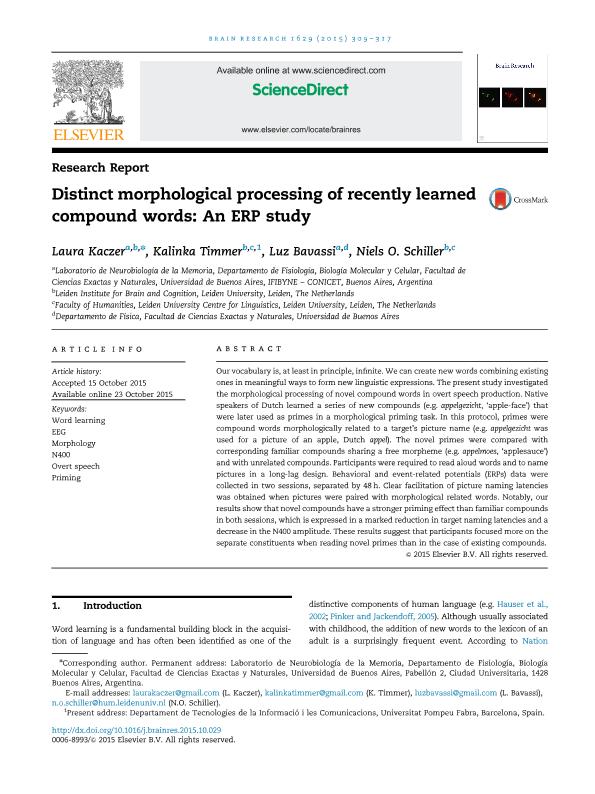Artículo
Distinct morphological processing of recently learned compound words: An ERPstudy
Fecha de publicación:
11/2015
Editorial:
Elsevier Science
Revista:
Brain Research
ISSN:
0006-8993
Idioma:
Inglés
Tipo de recurso:
Artículo publicado
Clasificación temática:
Resumen
Our vocabulary is, at least in principle, infinite. We can create new words combining existing ones in meaningful ways to form new linguistic expressions. The present study investigated the morphological processing of novel compound words in overt speech production. Native speakers of Dutch learned a series of new compounds (e.g. appelgezicht, ?apple-face?) that were later used as primes in a morphological priming task. In this protocol, primes were compound words morphologically related to a target?s picture name (e.g. appelgezicht was used for a picture of an apple, Dutch appel). The novel primes were compared with corresponding familiar compounds sharing a free morpheme (e.g. appelmoes, ?applesauce?) and with unrelated compounds. Participants were required to read aloud words and to name pictures in a long-lag design. Behavioral and event-related potentials (ERPs) data were collected in two sessions, separated by 48 h. Clear facilitation of picture naming latencies was obtained when pictures were paired with morphological related words. Notably, our results show that novel compounds have a stronger priming effect than familiar compounds in both sessions, which is expressed in a marked reduction in target naming latencies and a decrease in the N400 amplitude. These results suggest that participants focused more on the separate constituents when reading novel primes than in the case of existing compounds.
Palabras clave:
Word Learning
,
Eeg
,
Morphology
,
Priming
Archivos asociados
Licencia
Identificadores
Colecciones
Articulos(IFIBYNE)
Articulos de INST.DE FISIOL., BIOL.MOLECULAR Y NEUROCIENCIAS
Articulos de INST.DE FISIOL., BIOL.MOLECULAR Y NEUROCIENCIAS
Citación
Kaczer, Laura; Timmer, Kalinka; Bavassi, Mariana Luz; Schiller, Niels; Distinct morphological processing of recently learned compound words: An ERPstudy; Elsevier Science; Brain Research; 1629; 11-2015; 309-317
Compartir
Altmétricas




